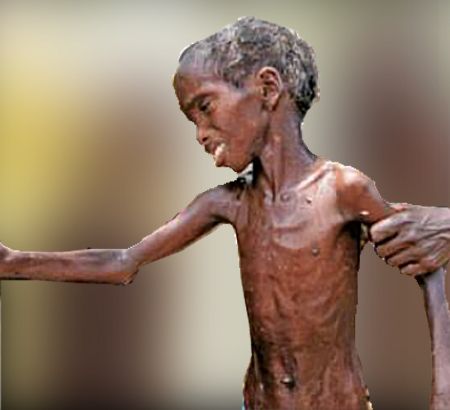73 MILLION AFRICANS
AT THE EDGE OF FAMINE IN 2019HOW MUCH IN 2020 AFTER CORONAVIRUS ? |
|
The past year, it is Africa that has paid the highest price, with 73 million people affected by famine, according to a UN report released Tuesday, April 21, 2020, which fears that the pandemic Covid- 19 is not an aggravating factor. 73 million people affected by famine Among the countries whose population is most widely affected by the scourge of famine, South Sudan (61%), Yemen (53%), Afghanistan (37%), but also Syria, Ethiopia , the Democratic Republic of Congo (DRC), Sudan and the northern part of Nigeria.
Regional conflicts in particular continue to cause high levels of acute food insecurity "in the Lake Chad basin and the center of the Sahel". This food insecurity will be compounded by the Covid-19 pandemic. The coronavirus has indeed gradually taken root in Africa, with more than 15,000 cases and 800 deaths recorded on the continent. However, the countries affected by these food crises have "a very limited or nonexistent capacity to cope with both the health and economic consequences" of the Covid-19 pandemic, the report specifies. The impact that the pandemic caused by the new coronavirus could have is likely to hit the vulnerable communities in the poorest countries of the world hard. Limited capacity to deal with the consequences of coronavirus To contain the spread of the virus, some African countries have applied a form of containment. Monday April 2 Nigeria extended the confinement for two weeks to Abuja, the federal capital, and Lagos, the most populous city in Africa with 20 million inhabitants. Benin, Côte d'Ivoire, Burkina Faso and Niger have confined their capitals. Kenya has isolated Nairobi from the rest of the country and imposed a night curfew. However in all these cities, millions of people depend on the informal economy to survive and live in slums. 60% of the inhabitants of Nairobi for example live in slums. The populations therefore have difficulty accessing food markets, and they are facing the start of a rise in prices and a decrease in the availability of certain basic foodstuffs, consequences of the confinements or curfews put in place, of the closure borders and insecurity in certain areas. Whatever the different types of containment, "containment is impossible to implement and is untenable in most of Africa," argues Jakkie Cilliers, expert at the Institute for Security Studies. You condemn people to choose between starving or getting sick. " Overwhelming figures for West Africa alone Some 50 million people are at risk of hunger in West Africa due to the impact of the Covid-19 epidemic added to the problems of drought and insecurity in the region, warned the NGO Oxfam Tuesday April 21. The number of people in food crisis could more than double in three months, to 50 million in August against 17 million in June, according to Oxfam, which quotes estimates from the Economic Community of West African States (ECOWAS) . Even if some African states have taken social measures - by distributing food, water for free ...the challenge can only be met on a continent largely dependent on international donors with the help of the latter.... |
|
| Kelly Donaldson for DayNewsWorld | |
 |
|




